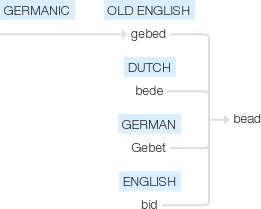Bead
Old English gebed ‘prayer’, of Germanic origin; related to Dutch bede and German Gebet, also to bid2. Current senses derive from the use of a rosary, each bead representing a prayer.
wiktionary
From Middle English bede(“a prayer”), also “a bead for counting prayers” in a peire of bedes(literally “a pair of beads”), from Old English bedu, bed, ġebed(“a request, entreaty, prayer”), from Proto-West Germanic *bedu, *bed, *gabed, from Proto-Germanic *bedō, *bedą.
Cognate with Dutch gebed and bede, German Gebet.
etymonline
bead (n.)
mid-14c., bede "prayer bead," from Old English gebed "prayer," with intensive or collective prefix *ge- + Proto-Germanic *bidam "entreaty" (source also of Middle Dutch bede, Old High German beta, German bitte, Gothic bida "prayer, request"), from PIE *bhedh- "to ask, pray," perhaps from a root meaning "to press, urge," hence "to pray."
Shift in meaning came via rosary beads threaded on a string to count prayers, and in verbal phrases bid one's beads, count one's beads, etc. German cognate Bitte is the usual word for conversational request "please." Compare Spanish cuentas "the beads of a rosary," from contar "to count."
The word is also related to bid (Old English biddan) and Gothic bidjan "to ask, pray." Sense in Modern English was transferred to other small globular bodies, such as "drop of liquid" (1590s), "small knob forming front sight of a gun" (1831, Kentucky slang); hence draw a bead on "take aim at," 1841, U.S. colloquial.
bead (v.)
1570s, "to adorn with beads," from bead (n.). Meaning "to string like beads" is from 1819. Intransitive sense "form in beads" is from 1873. Related: Beaded; beading.
